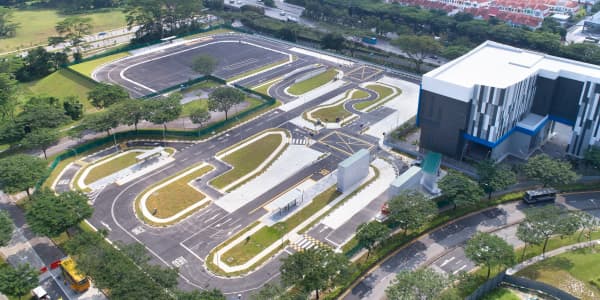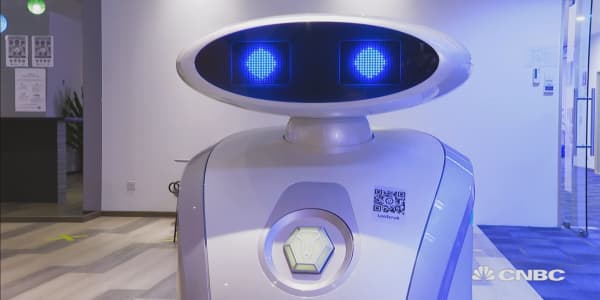SINGAPORE — Donning virtual reality headsets and hand-held controls, medical undergraduates in Singapore enter a simulated hospital environment to learn about patient care — digitally.
Even though the setting resembles a virtual game, the experience is designed to teach future doctors the procedures required for surgery, from anesthesia and safety protocols to patient management.
The coronavirus outbreak has forced educators in the city-state to get more creative and has advanced online learning.
Singapore has reported more than 57,500 cases of the Covid-19, and migrant workers make up nearly 95% of them. The spread of the infection outside migrant dormitories appears to be largely under control, but the country will face the same post-pandemic challenges that the rest of the world faces.
The virtual experience for the medical students is the latest education technique used by the Yong Loo Lin School of Medicine at the National University of Singapore (NUS). Also known as Pass-It — or Patient Safety as Inter-Professional Training — it helps students understand how to treat patients safely where they would have otherwise accompanied a doctor to a patient's bedside or the operation theater.
"Pass-It's 'gamified' style lets multiple learners be immersed in situations where they are given the opportunity to participate in what would usually be a highly restricted environment," said Associate Professor Alfred Kow, a surgeon and Assistant Dean of education at NUS Medicine, who is one of the educators spearheading this digital initiative.
"With the Covid-19 situation, students have also been removed from these settings of practical learning due to the risk of exposing them to aerosol-generating procedures."
Digital learning is not new to Singapore schools, but the pandemic has made remote learning more important than it was before.
Even before the pandemic, medical students at the Nanyang Technology University were already taking their education digitally, with some scanning bar codes of diseased organs stored in jars, while others bent over human bodies preserved in plastic polymers at the dissection table. Others who prefer a more hands-on experience use 3D printers to reconstruct scans of an organ with color codes.
"In this part of the world, we may be the first ones to deliver a curriculum with plastinated specimens," said Dr. Sreenivasulu Reddy Mogali, head of anatomy at the Lee Kong Chian School of Medicine at NTU.
Singapore's government is pushing universities and other schools to come up with better ways to prepare students for the more digitized jobs they'll encounter in the future.
A.I. assistance
Another university, the Singapore Management University (SMU), is trying to make use of so-called e-learning and artificial intelligence.
"With AI and machine-learning, you can use data to make smarter recommendations to students in terms of what courses they should pick, or how they can leverage their strengths, or perhaps work on their weaknesses," said Dr. Lieven Demeester, director for the Centre for Teaching Excellence at SMU. "The pandemic and the online teaching that came with it has generated renewed attention to the value that instructors bring."
With funding from Singapore's government, most universities are investing in artificial intelligence.
NTU is using AI to track the progress of students, and develop a platform that gives virtual lessons.
The school is looking at the impact of technology on society, AI and ethics. It is also working with IBM Watson, an artificial intelligence platform, to develop a virtual tutor to help with digital learning at its school of medicine.
Prof. Tan Ooi Kiang, deputy provost of education at NTU, said the university is using AI to track student assessments. It enables the school to tailor its remedial lessons to weaker students, and help them in the topics they are struggling with.
In line with its goals to extend learning into the digital realm, NUS is offering its engineering undergraduates three new specializations: Internet of Things, Robotics and Digitalization in Urban Infrastructure.
"NUS has leveraged digital technology to broaden our teaching pedagogies," said Prof. Bernard Tan, Senior Vice Provost of Undergraduate Education at NUS, in an email. Examples include the use of game-based learning and "flipped classrooms," a teaching method where courses are delivered online to students who later attend follow-up classroom activities to practice and discuss the subject.
He said the university also uses augmented reality and virtual reality for learning. Augmented reality is an enhanced reality created through computer graphics and technology, while virtual reality uses computer technology to create a simulated 3-dimensional environment that is interactive and can be used for educational or entertainment purposes.
Government initiatives
The Singapore government has invested heavily into preparing its citizens for a digital economy through projects such as SkillsFuture, which was started in 2015 to encourage people to upgrade their skills in order to meet workforce requirements. The government credits 500 Singapore dollars to all Singaporeans aged 25 and older to help them develop new skills. An additional one-time credit of the same amount is also being provided now to support mid-career transitions for citizens between the ages of 40 and 60.
"We operate in four countries but the support we've got from the Singapore government has been number one so far," said Nitish Jain, President of S.P. Jain School of Global Management. The college was invited by the Singapore government to set up a campus on the island, along with graduate business school, INSEAD, and the University of Chicago Booth School of Business.
Undergraduate students at the college study in different campuses across Singapore, Mumbai, Dubai and Sydney, and get conferred an Australian degree. As part of its digitization efforts, the school runs classes in Singapore where working professionals can log in from any part of the world, interact with faculty members, as well as collaborate and share documents with fellow students that are saved in the university's cloud system.
"We've seen our Executive MBA online classes grow by six times since the pandemic," said Jain, citing student enrollment from Vietnam, Indonesia, India, Australia, Europe and U.S. "No need to travel, no quarantine, nothing."
Correction: This article has been updated to correctly identify the deputy provost of education at NTU.





